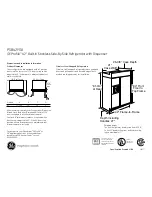
38
INSTALLATION AND OPERATING CONDITIONS OF THE APPLIANCE
* Only free- standing appliances
** According to the model
Installation before using the ap
-
pliance for the first time
● Take the product out of the package,
re- move the scotch tape protecting the
door and the equipment. Any remaining
adhesive stains may be removed with a
mild washing agent.
● Do not throw away the polystyrene ele-
ments of the packaging. If it is necessary
to transport the fridge-freezer, pack it in
the polystyrene elements and film as well
as protect ing it with scotch tape
● Clean the interior surface of the fridge-
freezer and the elements of the equip-
ment with a washing agent dissolved in
lukewarm water, then wipe it dry.
● Place the fridge-freezer on an even, flat
and stable surface, in dry, aired and
shaded room, far from the heat sources
such as: oven, hob, central heating ra-
diators, central heating pipes, hot water
installation, etc.
● On the exterior surface of the product
may be a protective foil, this foils should
be removed.
● Make sure the appliance is placed in a
horizontal position by screwing in the 2
adju- stable front legs (fig. 3)
● To ensure that the door opens freely, the
distance between the side of the applian-
ce (on door hinges side) and the wall is
shown on figure 5.*
● Ensure adequate ventilation of the room
and free air circulation from all sides of
the appliance (fig. 6).*
Minimum distances from the heat
sources
- from the electric gas and other ovens -
30 mm,
- from oil or coal fired ovens - 300 mm,
- from built-in ovens - 50 mm
If there is no possibility of ensuring the
above- mentioned distances, provide an
appropriate insulation board.
● The rear wall of the refrigerator, in parti-
cular, the condenser and other elements
of the cooling system must not contact
other elements, which may damage
them, (e.g. central heating pipes and the
water supply pipes).
● It is forbidden to readjust or modify
any parts of the unit. It is crucial not to
damage the capillary tube visible in the
compressor recess. The tube may not
be bent, straightened or wound.
● If the capillary tube is damaged by the
user the guarantee will be void (fig. 8).
● In some models the handle is put into
the appliance, You should screw it with
Your own screwdriver,
Mains connection
● Prior to connection, it is recommended
to set the temperature control knob to an
„OFF” or other position that disconnects
the appliance from the power supply
(See page with the control description).
● This appliance should be connected to
AC 220-240V 50Hz supply socket. The
socket must be fitted properly, and must
be supplied with an earthing conduit and
a 10A fuse.
● It is a legal requirement that the applian-
ce is properly earthed. The manufacturer
will not be held liable for any damage or
injury which may result from the failure
to fulfil this requirement.
● Do not use adapters, multiple sockets
and two-wire extension leads. If it is
necessary to use the extension lead, it
must be equipped with a protection ring
and a single socket and must have a
VDE/GS safety certificate.
● If an extension lead is used (with a
protection ring and safety certificate), its
socket must be located at a safe distan-
ce, away from the sinks, and must not
be in a place where it could be flooded
by water or waste water.
● See the type plate at the lower part of the
internal wall of the appliance for detailed
specifications**.
Disconnecting the mains
● Make sure the appliance can be easily
disconnected from the mains, either by
pulling the plug out of the mains socket,
or by switching the two-pole switch off
(fig. 9).
EN
Содержание FK321.4DF
Страница 3: ...3 1 ...
Страница 4: ...4 3 2 8 9 10 5 6 ...
Страница 5: ...5 12 15 16 1 2 3 4 5 11b ...
Страница 6: ...6 1 2 3 4 5 6 7 8 20 ...
Страница 7: ...7 10 11 12 13 14 15 16 17 18 19 9 ...
Страница 8: ...8 ...
Страница 9: ...9 ...
Страница 85: ...85 ...
Страница 86: ...86 ...
Страница 87: ...87 ...
















































